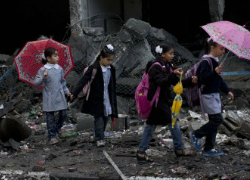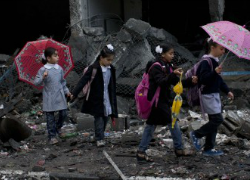
On November 22, 2012, after eight days of fighting, the Palestine militant group, Hamas, and Israel called a cease-fire. The violence resulted in over 160 Palestinians and six Israelis dead, while many more were injured. Israel’s casualties were less extensive thanks in large part to its Iron Dome defense system, which was able to intercept many of the rockets fired from Gaza. While the 1.7 million inhabitants of Gaza were severely “outgunned” by Israel, it was also the first time that Israel had experienced an attack on two of its main cities, Tel Aviv and Jerusalem.
Egyptian President Mohamed Morsy negotiated the crease-fire with a helping hand from the United States, as Secretary of State, Hillary Clinton, arrived in the wake of negotiations. While there is much discussion about the winners and losers of this fight, it seems that both sides feel they have won something.
The battle for Gaza Strip has been a bitter one, spanning decades, with stalled negotiations and violence setting the scene over the years. Little progress has been made over the decades and the same question remains: will this cease-fire finally result in a lasting change? In June of 2008, Egypt had successfully negotiated a six-month long cease-fire but during the truce, attacks had continued. Once the cease-fire officially ended in December of 2008, air strikes and ground offensives continued. In January of 2009, a week long cease-fire took place after a three-week long conflict, which resulted in 1,300 Palestinians and 13 Israelis dead. The attempted cease-fire, however, did not last as more violence and failed negotiations continued to stir the conflict.
The present cease-fire called for a “total cessation of hostile activity from Gaza,” and while the truce still stands, there is much confusion regarding its status. Israeli Military reportedly fired shots at the feet of Palestine’s who were attempting to cross the border resulting in at least one death and several injuries. Some analysts argue the new dynamic in the Middle East will make this time different but it still remains to be seen whether any successful and lasting negotiation will result.
To complicate matters, the body of former Palestine Liberation Organization leader, Yasser Arafat was recently exhumed to test for poisoning in connection with his 2004 death. After finding high amounts of radioactive material on his belongings, the body was tested for poisoning by the element polonium. The Palestine authority of West Bank stated it believes Israel to be behind the poisoning. While this conflict is between West Bank and Israel, West Bank expressed its full solidarity with Gaza during the recent attacks and this additional event could stir up more trouble in an already troubled region.
Lina Jasinskaite is a 3L at the University of Denver School of Law and a staff editor at the Denver Journal of International Law and Policy.


